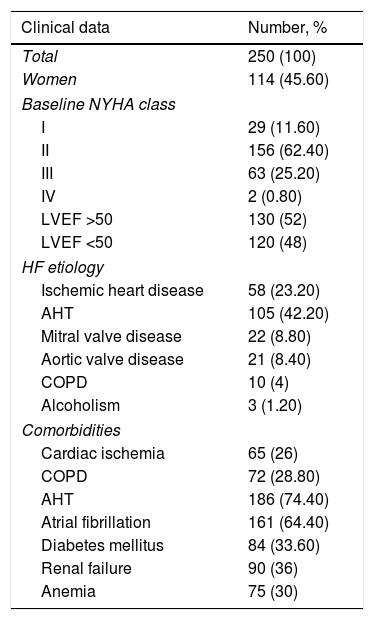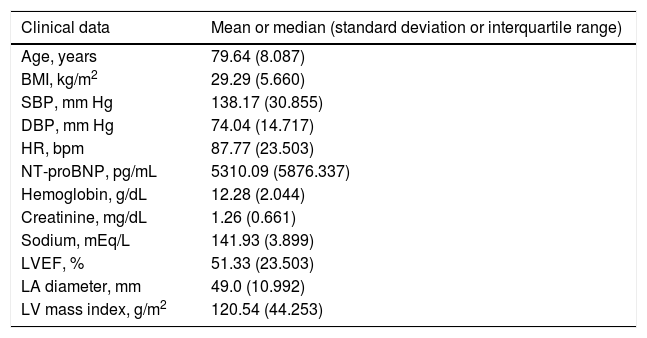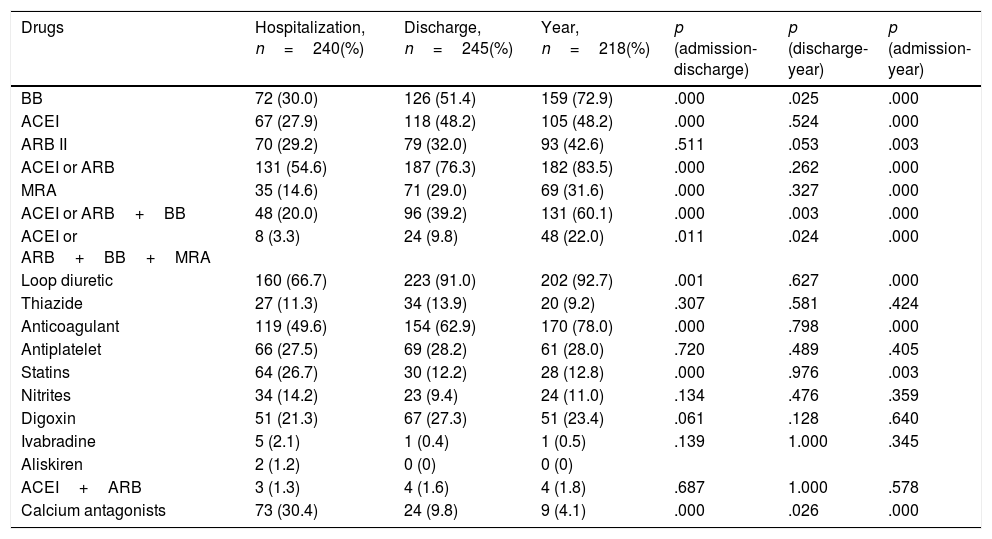Despite advances in the diagnosis and treatment of heart failure (HF), the condition still has high morbidity and mortality. Health education and the treatment of comorbidities have been shown to be effective, as has multidisciplinary care in specialized units, although this involves organizational and structural efforts that are not always feasible. We present the results of a simple outpatient consultation, focused on the specialized care of HF.
Patients and methodsThe consultation included patients discharged after hospitalization (index hospitalization) for decompensated HF from an internal medicine department. The follow-up was conducted by internists especially dedicated (not exclusively) to HF and a nurse partially dedicated to HF. The follow-up consisted of fixed visits 1, 3, 6 and 12 months after the discharge, with more visits on demand if needed.
ResultsA total of 250 patients were included with a minimum follow-up of 1 year. The reduction in hospitalisations and emergency department visits was 56% and 61% (p<.05), respectively, for HF and 46% and 40% (p<.05), respectively, for any cause. Treatment optimization was also achieved, with a significant increase in the evidence-based drug prescription rate and the reduction of other drugs, such as calcium antagonists.
ConclusionA simple model based on a specialized care consultation for HF is effective in reducing readmissions and optimizing the treatment. The lack of healthcare resources should not be an obstacle for specialized care for patients with HF.
A pesar de los avances en el diagnóstico y el tratamiento, la insuficiencia cardiaca (IC) sigue teniendo una alta morbimortalidad. El tratamiento de las comorbilidades y la educación sanitaria se han demostrado eficaces, así como la atención multidisciplinar, en unidades especializadas, aunque ello implica un esfuerzo organizativo y estructural no siempre disponible. Presentamos los resultados de una consulta ambulatoria simple, centrada en la atención monográfica a la IC.
Pacientes y métodosLa consulta incluyó a pacientes dados de alta tras una hospitalización (ingreso índice) por descompensación de IC en el servicio de Medicina Interna. El seguimiento se realizó por internistas con especial dedicación (no exclusiva) en IC y una enfermera con dedicación compartida. El seguimiento consistió en visitas fijas 1, 3, 6 y 12 meses tras el alta, más visitas a demanda en caso de necesidad.
ResultadosSe incluyó a 250 pacientes con un seguimiento mínimo de un año. La disminución de los ingresos y las visitas a Urgencias por IC fue del 56 y el 61% (p<0,05), respectivamente, y del 46 y el 40% (p<0,05) por cualquier causa. Además, se consiguió una optimización del tratamiento, con un aumento significativo en el porcentaje de prescripción de fármacos basados en la evidencia y reducción de otros, como calcioantagonistas.
ConclusiónUn modelo sencillo basado en la atención monográfica a la IC es eficaz en la reducción de reingresos y la optimización del tratamiento. La carencia de recursos asistenciales no debería suponer un obstáculo para una atención monográfica a pacientes con IC.
Article
Diríjase desde aquí a la web de la >>>FESEMI<<< e inicie sesión mediante el formulario que se encuentra en la barra superior, pulsando sobre el candado.

Una vez autentificado, en la misma web de FESEMI, en el menú superior, elija la opción deseada.

>>>FESEMI<<<










